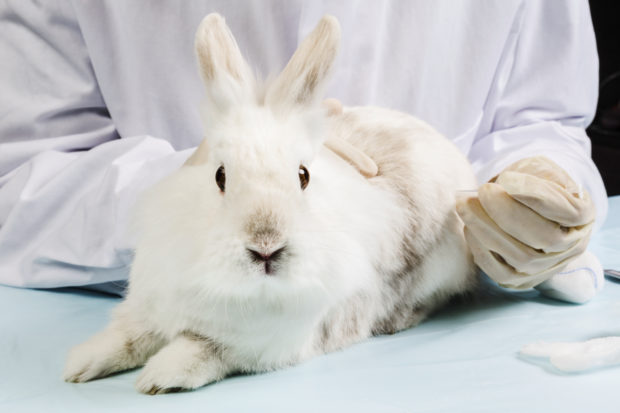
It’s no longer mainstream to apply or drop chemical substances onto the skin or into the eyes of rabbits or other animals. Photo by iStockphoto
Some years ago, a handful of companies rejected animal testing as a research and development practice and chose to only market products known to be safe to consumers. As a nod to the growing ranks of consumers concerned about animal cruelty, they affixed a symbol on their packaging to signal “No Animal Testing.” Over time, their market share grew, and customers associated them with the idea of doing the right thing.
Today, hundreds of companies – including leading brands such as LUSH, H&M and Paul Mitchell – are in the forefront of the movement against animal testing for cosmetics. It’s no longer mainstream to apply or drop chemical substances onto the skin or into the eyes of rabbits or other animals. The companies still involved in some way with new animal testing are sheepish about it, hoping that customers won’t notice. Any company with a backstory of animal testing and poisoning faces serious brand risk.
The days of hiding and obfuscating must end, and it is now time for all companies in the sector to stand and be counted, because key lawmakers have introduced the Humane Cosmetics Act in Congress and called for a national policy to prohibit the production and sale of animal-tested cosmetics in the United States.
It’s hardly a profile in courage for them to do so. Already, global cosmetic brands operate in a regulatory environment where animal testing is forbidden. At this time, 37 countries or political regions, including the European Union, Guatemala, India, Israel, New Zealand, Norway, South Korea, Switzerland, Taiwan, and Turkey, have banned or limited the use of animals for cosmetics testing. More than 1.8 billion people reside in countries where all cosmetic products on their store shelves were created without any new animal testing. The #BeCrueltyFree campaign is on the front lines in efforts to pass strict legislation to end cosmetic animal testing in countries including Australia, Brazil, Canada, Mexico, Chile, Argentina, and the United States.
There are some companies holding up global progress, and supporting a legal patchwork that allows them to still conduct animal tests. That’s why The HSUS, Humane Society International, and the Humane Society Legislative Fund are calling on L’Oréal, as the largest cosmetics manufacturer in the world, to support strict legislation that will prohibit the use of animals for cosmetics testing and the sale of cosmetics that were newly tested on animals.
While L’Oréal claims that it “no longer tests any of its ingredients on animals and no longer tolerates any exception to this rule,” it continues to sell its products in China, where animal testing is required for most cosmetics. Cosmetics testing in China is estimated to inflict suffering and death on as many as 375,000 rabbits and other animals each year.
L’Oréal made the business decision to sell its products in China despite this fact. Even if L’Oréal is not doing the testing itself, it is still giving its consent to this practice.
Non-animal testing strategies use human-cell-based tests and sophisticated computer programs to provide human-relevant results. These methods often provide a savings in time and money for the industry. The HSUS family of organizations recognizes and appreciates L’Oréal’s leadership on non-animal alternative test development and is very pleased to be partnering with the company in the Human Toxicology Project Consortium. However, the time has come for this multinational cosmetics company to join our global #BeCrueltyFree campaign and forswear, as a matter of global policy, the practice of cosmetic animal testing once and for all.
L’Oréal must already comply with animal testing and trade bans in more than 30 countries and would only benefit from further harmonization of international cosmetics laws. The company should make the ethical decision to publicly support watertight legislation and show that it truly cares about animals, and is working to end cosmetic animal testing. A Care2 petition launched earlier this month has already garnered support from more than 77,000 signers.
Half measures and expressions of preferences sound hollow. What we need – what animals need – is emphatic support for government policies that forbid animal testing. Anything short of that is just superficial, and it’s enabling ugly practices to continue. Join us, L’Oréal. To paraphrase the slogan of the company, it’s time to ban animal testing, because they’re worth it.
The post HSUS calls on L’Oreal to embrace a global ban on animal testing for cosmetics appeared first on A Humane Nation.
Enviroshop is maintained by dedicated NetSys Interactive Inc. owners & employees who generously contribute their time to maintenance & editing, web design, custom programming, & website hosting for Enviroshop.
